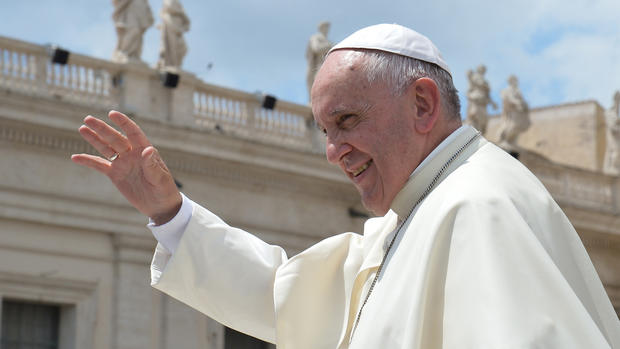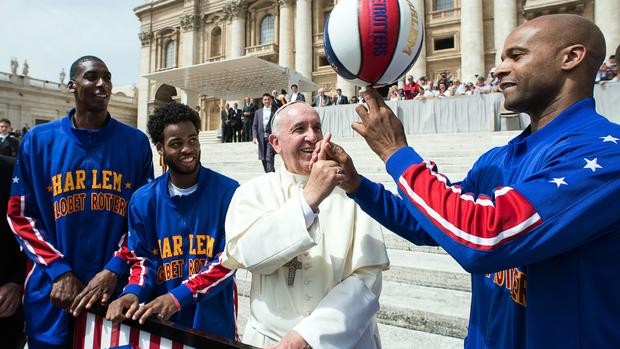Poll: Pope Francis' approval rating drops in U.S.
Two months before his first visit to the United States, Pope Francis' popularity has dropped sharply among Americans, largely due to his stances on global economics and climate change, according to a Gallup poll released on Wednesday.
The poll shows significant decreases from last year in approval ratings among both political conservatives and liberals, and among Catholics and non-Catholics alike.
Francis' overall favorability rating plunged from 76 percent in February 2014 to 59 percent in July of this year. Meanwhile, the percentage of Americans who see him in an unfavorable light rose, from 9 percent to 16 percent.
The most dramatic drop in approval was among political conservatives; their favorable rating dropped a whopping 27 points, to 45 percent. But favorability also dipped among liberals (down 14 points, to 68 percent). Among all Catholics, Francis' rating dropped from 89 percent to 71 percent.
The Pope's favorability ratings are now back to where they were soon after he was elected in 2013.
Princeton Professor Robert George, a prominent Catholic conservative thinker, told CBS News that the waning of Francis' popularity was to be expected, because he is an outspoken leader. "Given that he leads a Church that stands for certain things -- things that are controversial and rejected by some -- his popularity was bound to fall as he moved forward in his pontificate proclaiming the truths of the faith."
Gallup analyst Art Swift wrote that the decline among conservatives "may be attributable to the pope's denouncing the 'idolatry of money' and attributing climate change partially to human activity, along with his passionate focus on income inequality -- all issues that are at odds with many conservatives' beliefs."
- Pope Francis deepens rift with U.S. conservatives (01/19/15)
- Pope Francis played role in changing Cuba-U.S. policy ("CBS Evening News," 12/17/14)
But Monsignor Anthony Figueiredo, a spiritual director at the Pontifical North American College in Rome (and a CBS News consultant), believes that the conservative drop has to do with a misreading of where the Pope stands on moral issues, despite the fact that the Pope is "moving much more towards an emphasis on traditional teaching. "
"Moral issues are where the rubber hits the road in Catholic circles," Monsignor Figueiredo said. "Traditionally, this is where Catholics across the spectrum -- whether they are liberals or conservatives, rich or poor -- have common ground on issues such as abortion, family, contraception and so on. If people really began to read what the Holy Father has been saying, I think they would discover that, from [his] initial opening on these issues, he is now focusing on the reality, because he is beginning to see it. I think that they would see that Catholic teaching remains the same as ever."
Moral issues may also be the reason Francis is less popular among liberals. Swift theorized that liberals' approval may be waning because many believed that Francis would change church doctrine. While the Pope has repeatedly called for a more open, inclusive church, official church teaching on controversial issues such as contraception, gay marriage or the ordination of women has remained unchanged.
- Vatican no longer "welcoming" gays in draft report translation (12/16/14)
- Pope change his mind on breeding "like rabbits"? (01/21/15)
Father John Zuhlsdorf, a traditionalist priest and author of the widely-read conservative Father Z's Blog, told CBS News he had predicted from the beginning that things would start to turn when the Pope didn't fulfill liberals' expectations of what he called certain "pet" issues. "I think they thought that his new style and sometimes surprising way of speaking reflected their own liberal tendencies, when in fact he's a man of the church and he is not about to overturn doctrines which are quite simply impossible to overturn," he said.
Professor George says that liberals "had read a great deal into his famous question, 'Who am I to judge,'" and were expecting Pope Francis to evolve into accepting same-sex marriage. 'That was an absurd fantasy," said George.
Significantly, the Gallup poll was conducted in July while Pope Francis was visiting three of South America's poorest countries, where he uttered some of the most powerful words of his papacy. In one hour-long passionate speech he gave in Bolivia, the continent's poorest country, he pleaded for a new economic world order which protects the poorest, asked forgiveness for the sins of the Catholic church against Latin America's indigenous people, and called on humanity to save the planet from destruction caused by unfettered greed.
- Pope Francis urges Paraguay to seek peace, equality and justice (07/11/15)
- Pope Francis visits Paraguay slum, says Mass for 1 million (07/12/15)
When it comes to economics, says Professor George, Pope Francis is not saying anything that other popes haven't -- namely that capitalism is a sound economic system, but that unfettered capitalism can be "exploitative and dehumanizing."
"These statements were interpreted by some on the left, and on the right, as wholesale condemnation of the market system and the principles of economic freedom." said George. "Those on the left cheered. Those on the right were appalled.
"I'm sure the Holy Father would be the first to say that he needs to state things a bit more carefully and precisely to avoid having his words misinterpreted or easily manipulated," he said.
During an on-board press conference on the return flight from South America, CBS News asked Pope Francis how he responded to the perception on the part of Americans that, when he railed against an unjust economic system, he was criticizing their economic system and their way of life.
"I heard that there were some criticisms from the United States," he answered. "I haven't had the time to read about it, because every criticism must be received, studied, and then dialogue must ensue. ... If I have not had a dialogue with those who criticize, I don't have the right to state an opinion, isolated from dialogue.
"I must begin studying these criticisms, and then dialogue a bit with this," he said.
Francis' stance on climate change has also contributed to the decline in his popularity. In June, he published an important church document called an encyclical, entitled Laudato Sii, attributing climate change partly to human activity and urging immediate action to combat it.
- Pope Francis says humans "irresponsible" with environment (07/07/15)
- Why the climate is such a hot topic for Pope Francis (06/11/15)
"I think people get tired of being berated," said Zuhlsdorf. He said a close look at the Gallup and other polls shows that the significant dip happened in the last six months, when media reports about Laudato Sii were abundant. "I'm wondering if the drop in popularity isn't because some of the things reported about Laudato Sii left Americans confused and perhaps even irritated."
With a recent Pew Research Center survey indicating that many Catholics are not convinced that human activity is causing global warming, Zuhlsdorf suggests "there's a disconnect between them and the pope's emphasis on climate change."
As was the case with Pope John Paul II and Pope Benedict (both of whose popularity rose following their visits to the United States), the Pope's popularity may rebound later this year when he visits New York, Philadelphia and Washington, D.C.
"Every country he's gone to, he's won over the crowds in an amazing way," said Figueiredo.

